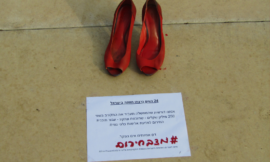Jews all over the world mourn the destruction of the Jewish temple and their exile from their land, on Tisha B’Av (the ninth day of the Jewish month of Av). Tisha B’Av took place today, July 16, 2013.
There are many stories about the destruction of temple. One famous story, which I would like to explore, is about a man named Kamtza and another named Bar-Kamtza.
The story is told of a wealthy man in Jerusalem who sent his messenger to invite his Jewish friend, Kamtza, to a lavish party he was throwing. Having erred, the messenger invited a man named Bar-Kamtza instead.
This may not have been a big deal, if Bar-Kamtza was not on the wealthy man’s hate-list. But he was. So Bar-Kamtza, who thought that the wealthy man wanted to make amends, showed up at a party he was not meant to be at.
Upon seeing Bar-Kamtza, the wealthy man ordered him to leave. Bar-Kamtza, noting the many Jewish scholars and other distinguished guests, asked to stay and promised to pay for his meal. The wealthy man refused. Begging to stay Bar-Kamtza offered to pay half of the party expenses. The wealthy man wouldn’t hear of it. Pleading with the wealthy man to spare him shame, Bar-Kamtza offered to pay for the entire party. The wealthy man would under no circumstances have Bar-Kamtza at his party and ordered him to leave the premises, causing him great shame.
Bar-Kamtza’s humiliation and anger brought him to seek revenge upon the Jewish scholars who did not prevent his exclusion from the party.
Bar-Kamtza went to the Caesar and told him that the Jews were rebelling against him. In order to prove that he was telling the truth, he told the Caesar to provide the Jews with a calf that they should sacrifice in their temple. Bar-Kamtza explained to the Caesar that the rebellious Jews would not sacrifice the animal.
On the way to Jerusalem, Bar-Kamtza inflicted a wound on the calf that rendered it unfit to be sacrificed according to Jewish Law.
In Jerusalem, the Jewish leaders debated how they should handle the situation. On the one hand, the calf was not fit to be sacrificed. On the other, they would offend the Caesar which could bring dire consequences upon them.
A leader at the time, Rabbi Zecharia Ben Avkulas declared that the animal should not be sacrificed. This provided the Caesar with proof that the Jews were in fact rebelling and ultimately led to the Caesar’s decision to destroy Jerusalem.
Now the question is, according to this story, who is in fact responsible for the destruction of the temple?
The wealthy man who threw the party?
The Jewish leaders who didn’t prevent Bar-Kamtza’s exclusion from it?
Bar Kamtza?
The Caesar?
Zecharia Ben Avkulas?
All of the above are options. All of them had a hand in the temple’s destruction.
But the gemara points the finger at only one of these:
“The humility of Rabbi Zecharia ben Avkulas caused the destruction of the Temple in Jerusalem” Gittin 55b-56a
The letter of the law is important. But it’s the spirit of the law that should never be renounced.
If we look closely at our sources, the Jewish prophets do not rebuke us for not keeping the letter of the law – the Sabbath, the holidays, the sacrifices. They rebuke us for not caring about charity, kindness and justice.
Our Jewish leaders must be wise, open minded individuals who know the law and understand it. Above all they must be able to assess life’s situations and apply the Torah’s law to it. They must have the ability to make courageous decisions.
Rabbi Zechari’s narrow-mindedness brought about the destruction of the temple.
May G-d grand us the wisdom to choose our leaders wisely.


